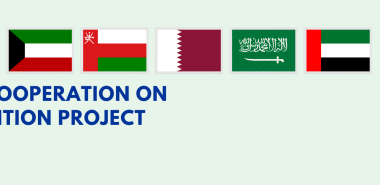Gulf Cooperation Council (GCC) and the EU
Dialogue and Cooperation has been intensifying over the years and is based on mutual interest to foster relations in all political domains.
The Cooperation Council for the Arab States of the Gulf (GCC) is a regional organisation comprising of six members: The Kingdom of Bahrain, the State of Kuwait, the Sultanate of Oman, the State of Qatar, the Kingdom of Saudi Arabia and the United Arab Emirates. Set up in 1981, its objectives are to enhance coordination, integration and inter-connection among its members.
EU-GCC relations are based on a Cooperation Agreement signed in 1989, which establishes regular dialogue on cooperation between the EU and GCC on economic relations, climate change, energy, environment, and research.
On 18 May 2022, the Commission and the High Representative adopted a Joint Communication on a strategic partnership with the Gulf, proposing a comprehensive and stronger partnership between the EU and the GCC and its Member States. It was endorsed by Council Conclusions on 20 June 2022. In June 2022, the High Representative/Vice President of the European Commission has appointed for the first time ever an EU Special Representative for the Gulf (Luigi Di Maio) to further develop a stronger, comprehensive and more strategic EU partnership with the countries in the Gulf region.
Navigate the topic
EU-GCC Cooperation Framework
The cooperation agreement of 1989 established an EU-GCC Joint Council at Foreign Ministers level that meets regularly and is prepared by a Joint Cooperation Committee discussing and advancing cooperation on sectoral areas of mutual interest.
Building on a strong mutual interest in deepening the trade and investment relations, a trade and investment dialogue has been established in 2017, with the last meeting taking place in Riyadh in March 2023. This sectoral dialogue is supported by an EU-funded project (Economic Diversification Dialogue) launched in 2019 that supports GCC countries in their economic diversification strategies based on the exchange of EU experience and expertise. The latter has been successful in identifying new business opportunities and areas of economic cooperation between the two regions as well as between the EU and individual GCC countries.
Following a temporary halt, including related to the GCC-internal ‘rift’ amongst some of its Member States and the Covid-19 pandemic, EU-GCC meetings have been reactivated in 2021 with a series of high level meetings covering all aspects of EU-GCC cooperation. Notably, the EU-GCC Joint Council held in Brussels on 21 February 2022 endorsed a Joint Cooperation Programme for the period 2022-2027 entailing concrete joint activities and cooperation on a wide array of areas, including trade and investment, climate change, energy and green transition, people-to-people, counter-terrorism and humanitarian aid. The Joint Council also affirmed that the EU-GCC partnership contributes to deepening mutual trust, achieving common interests, and maintaining regional and international security – something particularly pertinent in light of the ensuing Russian aggression on Ukraine unfolding days after that Joint Council meeting. The most recent EU-GCC Joint Cooperation Committee took place in Muscat on 27 March 2023 and was followed by an EU-GCC Joint Council meeting in Muscat on 10 October 2023. That Joint Council endorsed an updated version of the Joint Action Programme (2022-2027); discussed and agreed on enhanced cooperation and coordination in the field of Humanitarian Assistance and Disaster Relief; agreed on the establishment of a structured Security Dialogue as well as a Joint High level Forum meeting on regional security. EUSR for the Gulf, Luigi di Maio, attended for the first time a Joint EU-GCC Council meeting.
The EU is present in the region with three EU Delegations accredited to the six GCC Countries, notably the EU Delegation to Saudi Arabia, also accredited to the GCC and also covering Bahrain and Oman, the EU Delegation to the United Arab Emirates and the EU Delegation to Kuwait. In September 2022 the EU has opened the EU Delegation to Qatar.
Trade Relations with the EU
The GCC region was the 9th largest trading partner of the EU in 2022. With trade amounting to 174 bln Euro in 2022, the EU remains the second trading partner of the GCC and a significant source of investment for GCC countries (180 bln Euro of EU investment stocks in the GCC in 2021) The 1989 Cooperation Agreement included a commitment from both sides to enter into negotiations on a Free Trade Agreement. Negotiations started but have not yet allowed for an agreement to be reached. Informal contacts continue. The EU and GCC held the 5th Trade and Investment Dialogue at the GCC Secretariat in Riyadh, Saudi Arabia, in March 2023. The 7th GCC-EU Business Forum took place in Manama, Bahrain, in November 2023.
Instruments for cooperation
To advance dialogue and cooperation with the GCC countries on strategic areas of mutual interest, the EU funds a series of projects in the region; an example is the Enhanced EU-GCC political dialogue, cooperation and outreach. The EU is soon to launch two new actions to deepen dialogue on green deal and on economic diversification.


